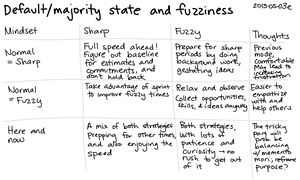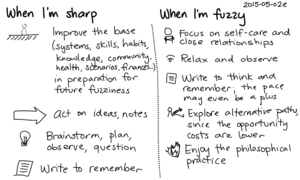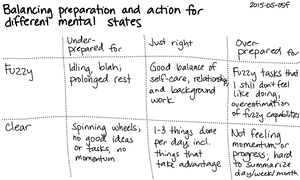Embracing the fuzziness
Posted: - Modified: | productivityI'm feeling a little more clear-headed at the moment – not as fuzzy-brained as before. Well, there's the slight matter of my ongoing cough and congestion, so I'm not quite all the way there, but I can think more easily than I did last week.
Cycling through different mental states (normal, squirrel, fuzzy, etc.) in quick succession has been helping me get better at differentiating among them, and I've been thinking about how I can make the most of them. In particular, I've been thinking about the consequences of considering one or the other as my "default" state, or of getting rid of the notion of a default state altogether.
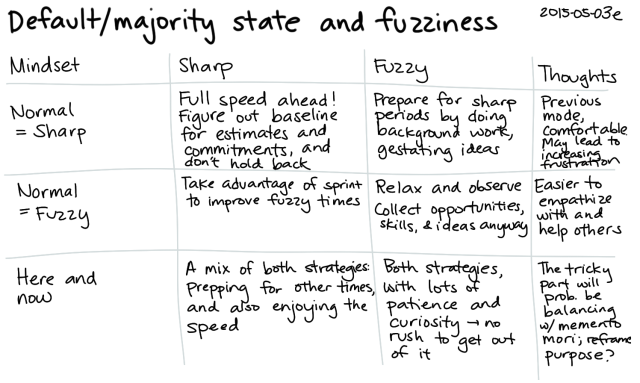
If I think of clarity as my normal state and fuzziness as a short interruption, then when I'm sharp, it makes sense to make the most of it, and when I'm fuzzy, it makes sense to do the background work that will help me make the most of my next sharp period.
If I think of fuzziness as my normal state and clarity as a gift, then when I'm clear, it makes sense to invest a lot into building the systems, habits, and skills that would make fuzzy times even better. I'm not sure how probable this is, but I'm leaning towards it being likely, even though I tend to remember my past as clear. I'm basing this on the fact that many people around me have reported being relatively slower compared to their younger selves, possibly due to age and circumstances. On the other hand, I know a few people who are older than I am and who seem to be accelerating, so there's something to be said for that.
A mix of both strategies seems to make sense. I can spend some time putting the infrastructure in place to do well during fuzzy times, and I can also take advantage of quick sprints to make things happen when I have a clear idea.
So that might translate into the following:
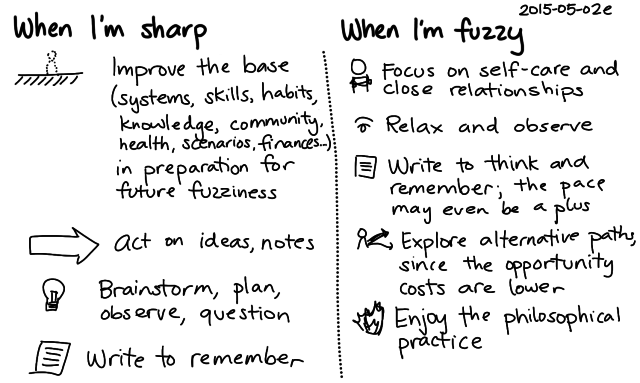
When I'm sharp, that's the time to lean in on health and systems and skills, the time to act on ideas and explore questions, the time to come up with lots of ideas and define tasks that I can do while fuzzy. It's important to write, too, so that I can remember what it's like to be sharp.
When I'm fuzzy and don't feel particularly like pushing, that's a good time to focus on self-care and close relationships. It's okay to relax, to observe, to explore.
One of the nice things about being fuzzy is that it's easier to explore alternatives and develop skills; it's all right to do something you're mediocre at when you feel mediocre at everything, or too fuzzy to do things you're normally excellent at. <laugh>
And there's always the philosophical practice at being patient and dealing with challenges… It's good.
Hmm. What's a good way for me to tell whether I'm under-preparing, over-preparing, or getting the balance right?
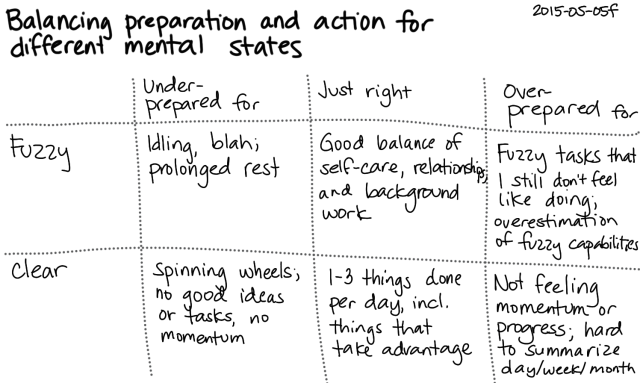
- If I under-prepare for fuzziness while I'm sharp, then when I'm fuzzy, I'm stuck with low-value activities like video games. This is okay, but with some thought, I might be able to tweak it to get more value.
- If I over-prepare for fuzziness while I'm sharp, then I'm missing the opportunity to build momentum and get stuff done.
- If I under-prepare for sharpness while I'm fuzzy, then when I'm sharp, I end up spinning my wheels or doing things that I could have done when I was fuzzy anyway.
- If I over-prepare for sharpness while I'm fuzzy, I might prolong my fuzziness or feel bleah.
Hmm. It might be interesting to revisit my notes on the kinds of things I can do when I'm sharp and when I'm fuzzy (High energy and low energy activities). That might help me detect if I'm using my sharp time well.
Also, it's okay not to totally optimize this. =) I can be a little inefficient.
There's definitely more fuzziness in my future. It might be interesting to graph this to see when I'm majority-sharp and when I'm majority-fuzzy, but even without those patterns, it can help to start slowly thinking about how I can make this better. Hmm…

